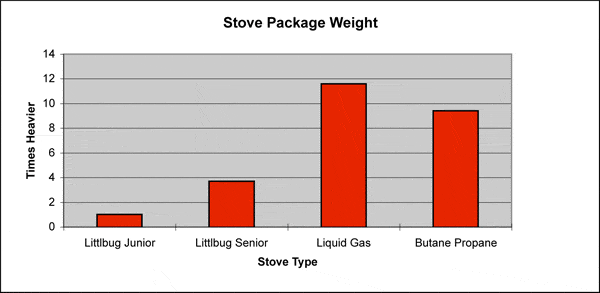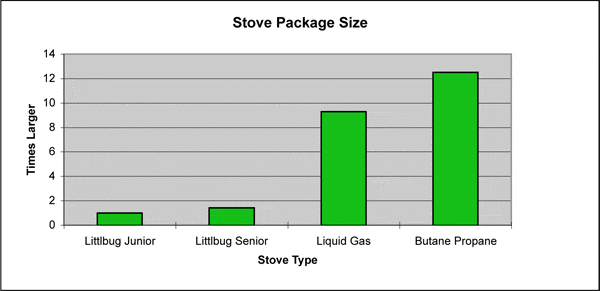- Home
- About Our Stoves
- Wood vs Petroleum Stoves
Wood vs Petroleum Stoves
Introduction:
Littlbug camp stoves burn wood or alcohol. Go light and gather sticks and twigs for your stove or carry alcohol for quick, convenient heat. You can switch between using wood and alcohol to meet your needs and still pack less weight than you would for a stove that requires refined fuel. Littlbug challenges the assumption that a backpacking stove has to take space in your pack. Littlbug Stoves’ unique geometry results in a remarkable size reduction when stowed for transport, and the pieces nest in a fashion that permits you to wrap the stove around a sleeping pad.
Designers of gas stoves are hindered in their attempt to reduce the size and weight of what you carry because most of the size and weight of their package is fuel. Littlbug Stoves are designed to reduce or eliminate the need to carry fuel – the choice is yours. Littlbug Stoves burn sticks and twigs, so depending on where you go, you may not need to carry fuel. This provides weight, space, and operating cost savings.
Details:
Liquid and butane/propane stoves use refined fuel, fuel containers, windscreens, heat exchangers, and spare parts. Some or all of these elements make up the total package that ends up on your back. Each piece adds to the weight that you have to carry and uses up space in your pack. The largest and heaviest part of this package is fuel. The amount of fuel you decide to carry depends upon your own particulars. For this comparison, two fuel containers were used. You can adjust the fuel quantity used in this comparison to match your requirements. For this comparison, it is assumed the Littlbug Stoves will be using wood for fuel.
Liquid fuel stoves range in weight from 372g to 659g (13.1oz to 1lb 7.3oz). For this comparison, the lightest stove was used. Fuel bottles are available in 11, 22, and 33 fluid ounce sizes. The medium size fuel bottle (22 fl oz) was used.
Butane/propane stoves range in weight from 180g to 754g (6.4oz to 1lb 10.6oz). For this comparison, the lightest stove was used. One 450g butane/propane fuel container will not last as long as one 22fl oz fuel bottle (approximately 25min/100g of fuel vs. 30min/100g of fuel). In this evaluation, they are considered to be equivalent.
This is how the stove packages compare.
| Item |
Littlbug Junior | Littlbug Senior | Liquid Gas | Butane Propane |
| Stove | 5.1oz/14cu in | 19oz/20cu in | 13oz/50cu in | 6.4oz/15cu in |
| 1st Fuel Container | Not Applicable | Not Applicable | 1lb 7oz/40cu in | 1lb 5oz/80cu in |
| 2nd Fuel Container | Not Applicable | Not Applicable | 1lb 7oz/40cu in | 1lb 5oz/80cu in |
| Windscreen | Not Applicable | Not Applicable | Optional | Optional |
| Heat Exchanger | Not Applicable | Not Applicable | Optional | Optional |
| Maintenance Kit | Not Applicable | Not Applicable | Optional | Optional |
| Total |
5.1oz/14cu in | 19oz/20cu in | 3lb 11oz/130cu in | 3lb 0oz/175cu in |
Stove Package Weight & Size Comparison Charts
 |
 |
The lightest comparable[1] liquid gas stove package weighs over 3.4lbs more than the Littlbug Junior Stove and takes over 9 times the space to transport. The lightest comparable butane propane stove package weighs 2.7lbs more than the Littlbug Junior Stove and takes over 12 times the space to transport.
The lightest comparable liquid gas stove package weighs over 2.5lbs more than the Littlbug Senior Stove and takes 6.5 times the space to transport. The lightest comparable butane propane stove package weighs 1.8lbs more than the Littlbug Senior Stove and takes over 8.75 times the space to transport.
If the gas stoves in this comparison would take no space in your pack, the fuel containers alone would still take 8 to 11 times the space of the Littlbug Junior Stove[2] - even after all the fuel is gone! It would be ideal to have a stove that takes no space in your pack and that's what the Littlbug Stoves are designed to do. You can wrap a Littlbug Stove around a sleeping pad and carry it on the outside of your pack.
Summary: This evaluation compares the weight and space requirements of various stove packages. The Littlbug Junior Stove is the lightest and takes the least space. There are other important factors to consider when you choose a stove. If you don't find your particular concern addressed in the FAQ (Frequently Asked Questions) please call Littlbug Enterprises @ 218-209-BUGS (2847) for more information. We welcome your comments and questions.
 Loading... Please wait...
Loading... Please wait...








